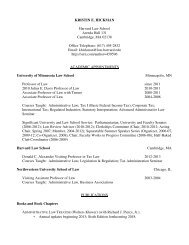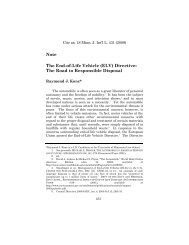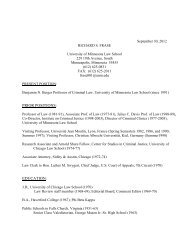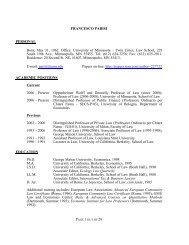Enabling Private Ordering - the University of Minnesota Law School
Enabling Private Ordering - the University of Minnesota Law School
Enabling Private Ordering - the University of Minnesota Law School
Create successful ePaper yourself
Turn your PDF publications into a flip-book with our unique Google optimized e-Paper software.
2009] UMBRELLA CLAUSES 29<br />
subject a contract to international law as <strong>the</strong> governing law. By<br />
means <strong>of</strong> such contractual arrangements, investors and States<br />
were able to deal with some <strong>of</strong> <strong>the</strong> problems arising out <strong>of</strong> <strong>the</strong><br />
national/international law divide under customary international<br />
law and <strong>the</strong> difficulties <strong>of</strong> host States to make credible and<br />
enforceable commitments vis-à-vis foreign investors absent<br />
effective third-party dispute settlement and enforcement<br />
mechanisms. Arbitration clauses removed <strong>the</strong> settlement <strong>of</strong><br />
disputes from <strong>the</strong> realm <strong>of</strong> domestic adjudication and alleviated<br />
<strong>the</strong> deficiencies existing in this respect; 70 choice <strong>of</strong> law clauses,<br />
stabilization clauses, and internationalization clauses, in turn,<br />
constitute a contractual solution to protect investor-State<br />
contracts against unilateral changes in <strong>the</strong> governing law by <strong>the</strong><br />
host State that might affect <strong>the</strong> contractual equilibrium. 71<br />
Never<strong>the</strong>less, purely contractual arrangements have<br />
significant drawbacks compared to a permanent institutional<br />
structure that provides for dispute settlement and enforcement<br />
<strong>of</strong> host State promises vis-à-vis foreign investors in general as it<br />
is done under modern investment treaties. 72 Above all, in <strong>the</strong><br />
absence <strong>of</strong> permanent dispute settlement and enforcement<br />
mechanisms, investor-State cooperation constantly requires<br />
negotiation about such mechanisms—negotiations that are not<br />
only time-consuming, but make <strong>the</strong> enforceability <strong>of</strong> <strong>the</strong> host<br />
State’s promise itself part <strong>of</strong> <strong>the</strong> bargaining mass—making not<br />
only <strong>the</strong> negotiations but <strong>the</strong> entire investment cooperation less<br />
efficient.<br />
Fur<strong>the</strong>rmore, while large-scale multinational firms may<br />
prove quite successful in such negotiations, even to a point<br />
where it makes no difference whe<strong>the</strong>r investment protection is<br />
<strong>of</strong>fered by an international treaty or by <strong>the</strong> contractual<br />
framework set out in an investor-State contract, <strong>the</strong> situation<br />
for middle or even small-scale foreign investors is different.<br />
They may not have <strong>the</strong> necessary market and bargaining power<br />
to negotiate comparable protection mechanisms. Smaller<br />
investors are thus placed at a structural disadvantage compared<br />
to larger investors because <strong>the</strong> host State commitments in<br />
relation to <strong>the</strong>m may be less credible due to <strong>the</strong> absence <strong>of</strong> pre-<br />
AUSLÄNDISCHER PRIVATUNTERNEHMEN 76–144 (A<strong>the</strong>naum Verlag 1971).<br />
70. See supra Part I.B.1.a.<br />
71. See supra Part I.B.2.b.<br />
72. See Barton Legum, The Innovation <strong>of</strong> Investor-State Arbitration under<br />
NAFTA, 43 HARV. INT’L L.J. 531 (2002) (discussing <strong>the</strong> differences between State<br />
consent in modern investment treaties and more classical cases).
















